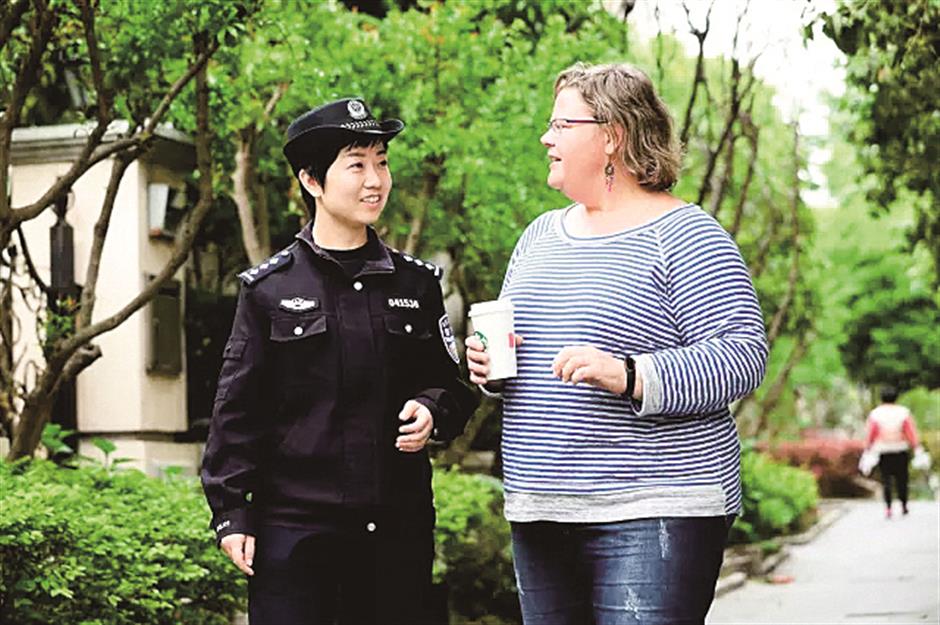Smile and compassion 'in community policing'

Sheng Shumin chats with a foreign resident during a routine patrol in the community.
“One perk of being a policewoman is that I always had stories to tell on a blind date,” said Sheng Shumin.
Though her dating days are over and she is now married and the mother of a two-year-old, Sheng’s police work continues into its ninth year.
Recently honored as a “National Good Police Officer, she transferred two months ago to the Hongqiao branch of the Minhang Police. It’s a different beat from the past, with 23,000 foreigners registered in her area.
When a Shanghai Daily reporter met her, Sheng was dealing with three Koreans involved in a fight with a Chinese. Earlier in the day, she said, she nabbed several Filipinos for stealing battery from mopeds.
Sheng approaches the people, no matter what their ethnic origin, with a smile. When not stuck in the office, she likes to patrol the streets, chatting with residents to hear their concerns.
She recalled the time she discovered an illegal kindergarten operating for Korean children. The teachers didn't have certification. The site had no fire or security apparatus. But Sheng was reluctant to close down the school because she was concerned about the plight of the children. So she set up negotiations with Hongqiao Town officials, and the school was eventually certified.
“I was told there wouldn't be much work when I was transferred,” she said. “But that hasn’t been the case. Yesterday, when several other officers and I were having lunch, we suspected that the Philippine owner of the place where we were eating was an illegal migrant. We asked to see her ID and found out that she indeed was illegally here. One more case to deal with.”
With more foreigners coming to the city, the job gets even busier. In the past, conflict in multinational communities usually centered around complaints about dogs and noise. Nowadays, the cases are more related to theft, arson unregistered businesses and illegal migrants.
“We run all cases according to procedures and rules,” she said. “Foreigners are not above the laws. Evidence is the only language we use in solving crimes.”
But multiculturalism does breed daily frustrations. Misunderstandings are rife, and some locals complain that foreign residents are treated better than Chinese. A report in April about a Danish tourist who recovered his recording pen with the help of Kunming police evoked thousands of online complaints. One Weibo user said, “Police wouldn't work that hard if it was a Chinese victim.”
Sheng tries to take it all in stride.
“I had a Chinese person reporting the theft of 20,000 yuan,” she said. “We looked at the tapes of every surveillance camera, but the thief fled by bike and we failed to track him down. One reporter accused us of not working hard enough to solve the case. He said we would have done better if the victim had been a foreigner. But that just isn’t true.”
Sheng and her colleagues often have to deal with foreigners who are arrogant. A British man had a conflict with his neighbor about construction noise, even though the neighbor was strictly following construction rules.
“I'm a pilot,” the man told Sheng, “and if I can’t sleep well during the day, the safety of passengers may be jeopardized. Would you want to be responsible if any accident happened?”
But Sheng protected the rights of the neighbor and resolved the issue by arranging for the pilot to stay in a hotel temporarily.
“No matter which country you come from, humanity is the same,” she said. “There are nice people and there are difficult people. We treat everybody the same, no matter what color or nationality. Being a policewoman is a demanding job, so a little understanding goes a long way.”
Sheng graduated from the English department of Nanjing University with no particular idea of going into law enforcement.
“It took my parents five years to get over the shock of my career decision,” she said. “But I just didn’t want to become a teacher or an office worker. I was looking for a job with a challenge, and I found one. I really like it.”
Her family worries about her safety and the odd hours she sometimes keeps. But Sheng never complains.
“I rather think this is the job for me. It’s rewarding to deal with people under new circumstances every day,” she said.
















